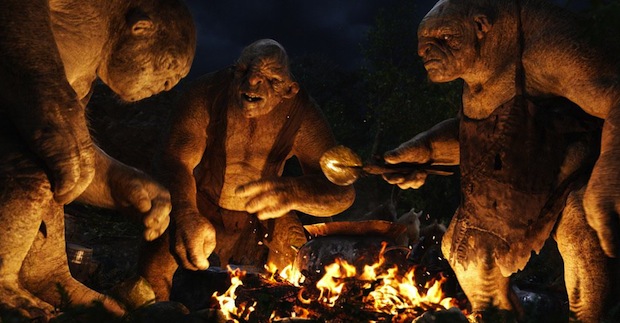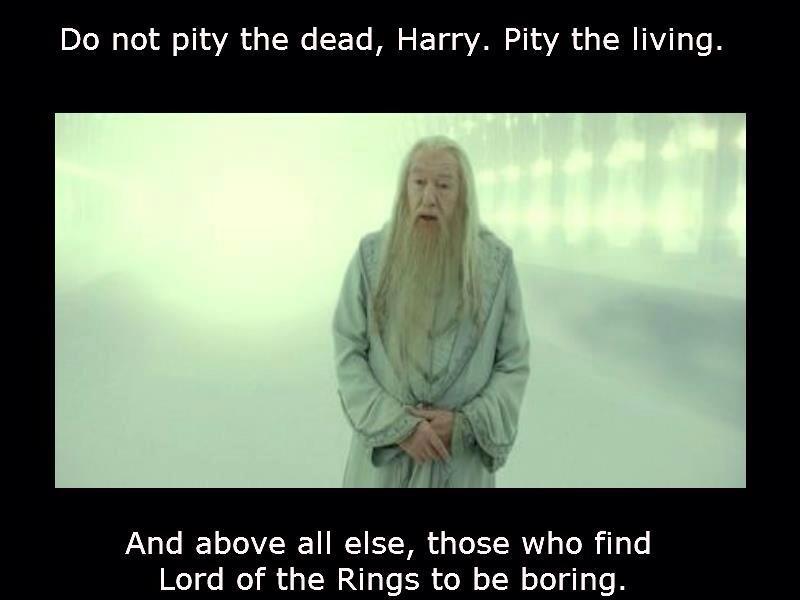‘The Hobbit’ Part 1: Too Dark or Bloated?

“Blimey, this stew is too bloated, I say.”
Today The Hobbit: An Unexpected Journey releases to Blu-ray and DVD. Now at last some critics will (in this viewer’s view) finally actually see the theatrical version of the film, and choose whether to reevaluate their perceptions of the film’s supposed overdone “darkness” and/or “bloatedness.”
Such as:
Still haven’t seen “The Hobbit” and will probably just wait for the DVD. The more I learn about it, the more it sounds like what I feared — bloated.
[Christian paranormal novelist], personal Facebook post, Feb. 18
J.R.R. Tolkien’s The Hobbit is often viewed as a children’s story in comparison to the more serious Lord of the Rings saga. Indeed, Tolkien imbued his characters in The Hobbit with a dose of whimsy that’s largely absent from the grimmer, gravitas-filled trilogy that follows it.
Peter Jackson didn’t get that memo.
PluggedIn.com reviewer Adam R. Holz, The Hobbit: An Unexpected Journey review
I don’t remember the book being that dark.
Wretched Radio (Christian talk program) host Todd Friel, Feb. 1 broadcast
This is like complaining about a (hypothetical) film remake of The Ten Commandments because it includes hints about Israel’s future rejection of its God and perhaps even need for final redemption.
Do we read the Bible that way: piecemeal, as if the Author’s later expansions never existed?
As aspiring author and SF contributor Adam Ross noted about who actually “didn’t get [the] memo”:
“I thought The Hobbit was a charming children’s story about hobbits and dwarves.”
You thought wrong. After finishing LOTR, Tolkien went back to The Hobbit and started work on a Hobbit 2.0, darker and more adult like LOTR, which strengthened the connections between the two and made the dark events of the book, spiders, trolls, orcs, more directly connected to the rising threat of the Shadow in Dol Guldur. It was abandoned because no one wanted it; what remains of it is recorded in the work “The Quest for Erebor”, to be found in the Appendices of LOTR. It is this enhanced Hobbit that Jackson is adapting. So, if you complained about all the “added” material, your complaint lies with Tolkien, not Jackson.
And as for the “bloated” complaint:
[W]ould you really want the Hobbit chopped down into a rush of a single film? Are you actually advocating spending less time in Middle Earth?
Perhaps some viewers’ answers would be yes. In that case, the only response may be this actural unretouched and verbatim quote from another famed fantasy franchise’s wizard, Prof. Dumbledore.

Hat tip: the Marcher Lord Press Facebook page.





























I’m waiting for the extended edition. No complaints about length here.
It’s the not-fans who are bored by the story and want to tell the rest of us what we should like. A sub-plot puts the critics out. And an unnecessary rabbit trail to meet an interesting character is too much. These are the same folks who want to cut Shakespeare’s plays down to West Side Story v1, v2, v3 … etc.
Not to be dismissive of those who are not fans … but To Be Dismissive of those critics who purport to tell others what to enjoy.
If you’re not a fan, fine; but don’t tell me what’s ‘too much.’ The critics love films which celebrate violence, disgusting behavior, and puerile interests.
I find about 90% of all film, and 100% of TV and ‘Broadway’ boring: It’s banal, vile, prurient, and derivative. I’d chuck it in its totality if it was on my shelf. I would love to have my life back for all the hours wasted taking friends and family to shows that I would never bother with.
So again, … this rant is only for those critics who want to tell me what I’m supposed to like.
The Hobbit was the fastest flick I’ve seen in years.
Walking out of the theater patrons stopped in the halls and discussed it until the ushers pushed us out. People shared cards and numbers and email accounts. The third time I saw the film I saw one 30 something bolt – apparently thinking he was going to see a new version of Thor or something like it. The theater owner herself showed up at least 4x to see the film and I saw her crying during the finale the last time I saw the film.
The critics hated it, but consider the box office: It’s the 14th highest grossing film of all time … and we know the people driving those sales are not the same ones going to see Cider House Rules or Stone or Cameron films.
What would you rather have? The accolades of critics who despise civilization and the commoners who make life possible or bearable? Or the applause of fans who wait years between artistic productions celebrating their culture, worldview, and spiritual perspective?
The producers, creators, imaginative, inspired innovators are starving for material opposing the agit-prop passing for entertainment these days. That’s why THE HOBBIT sells like hot cakes.
Just MHO…
What about my gripe that the general tone of the movie was too light, too goofy, and perhaps above all too casual? I know there’s both comic relief and a sense of joviality and jolly in Tolkien. I would have loved to have seen the jolly elves singing, but I’m not impressed by juvenile, out of character jokes about killing obese goblins. In my opinion, that is just another kind of cheap sensationalism.
(Really, that one scene with the goblin king was the only thing that I strongly disliked, but that one moment really did ruin the whole thing for me. Even without that, though, I still disliked the tone set by the dialogue and action.)
In reply, brother, I guess I would ask if you have read the book recently. Until the very last, arguably, it is also “too light, too goofy … too casual.” Very unlike the Middle-earth tone established in The Lord of the Rings. And appropriately so.
Tolkien was writing first for his children, then for other children.
Really it’s only at the last that the book itself begins to align with the tone of LotR, with the “dragon is dead, queue happy ending” theme subverted in favor of almost “modern” concerns and challenging ethics, Bilbo’s being forced into politics and a scenario in which it’s impossible not to seem like he’s betraying someone.
But until then, the story is very much extended fairy-tale. I felt the film drew that out wonderfully, with of course some attempts at dark humor that may not have gone over as well as the book’s dark-humor attempts (such as the Great Goblin death you mentioned). Meanwhile, as for jokes about killing people, I like to point out that Tolkien himself — Tolkien, who fought in wars and indeed explored the tragedy and yet necessity of war in the epic — also included Legolas and Gimli racking up their kills of Orcs/goblins. This was years before video games made crass “scoring” of one’s kills popular. Those who had not read the books, when asked, could easily conclude this was a modern anti-classical addition by Jackson.
I read the first four chapters recently, when you were doing the reading group.
I think you misunderstand me. I was thinking specifically of that horrible goblin liposuction scene. That one moment made me mad. I think my criticism about tone mainly has to do with the dialogue. I don’t think the wise, fantastic people of the story like Elrond and Gandalf (and Radagast and Galadriel) came across as very wise and fantastic and mysterious. I have read Elrond’s part in the book recently, and he is far more profound and mysterious and fantastic there.
At any rate, I apologize for the tone of my previous comment. I’m certain that my complaints are based on my strongly negative reaction to that one moment, the only time that I saw the film. I know that there were other elements that I liked very much. I should watch it again some day. Also, my comments were made partly from the knowledge that it’s Peter Jackson I’m criticizing, and I think he’s big enough to take miscellaneous complaints from miscellaneous nobodies like me, even if by some miracle he were ever to stumble across my comments.
I think it’s important to note that we’re evaluating 1/3 of a story as well. We can’t forget that. Critics and folks who complained that it “took too long to get going” are forgetting that Jackson isn’t just setting up this movie, but character arcs that will carry into two further films. You can’t do that with a five minute rush-job at Bag End just so you can get to the fighting bits. In fact, such objections are entirely infantile. The number of critics who objected to this would be the same ones who would scream that Jackson went for sensational battle extravaganzas by sacrificing character development. There’s just no winning, frankly.
That, coupled with the generally sneering tone of critics towards fantasy generally, the disaster of the 48 fps-3D fiasco which provoked a number of the negative reviews, the production problems and the fact that Jackson was still editing the thing when the press arrived to watch it (check out those bonus features on the DVD if you don’t believe me), the last-minute expansion of the story goes a long way to explain some of the negativity.
Frankly, the more I watch it, the more I think Jackson’s version was inevitable and well matched tonally as a Tolkien-Jackson hybrid.
Here’s a comment I wrote elsewhere:
Also, following Adam’s remark:
Can’t help but agree there. It also may be the case that some of us who really wanted The Hobbit to wow almost all critics as The Lord of the Rings did were disappointed when this didn’t occur — and then couldn’t help but repeat similar criticisms.
I actually thought it came off wonderfully. (I have not read the book.) I expected meandering, slow, and whimsical and got much, much more.